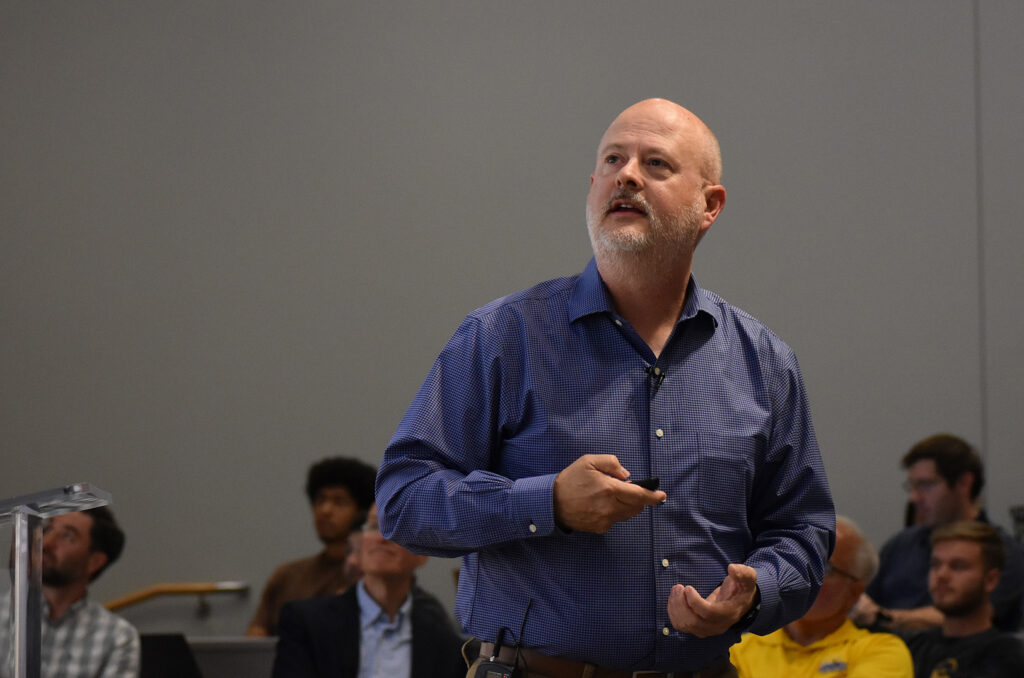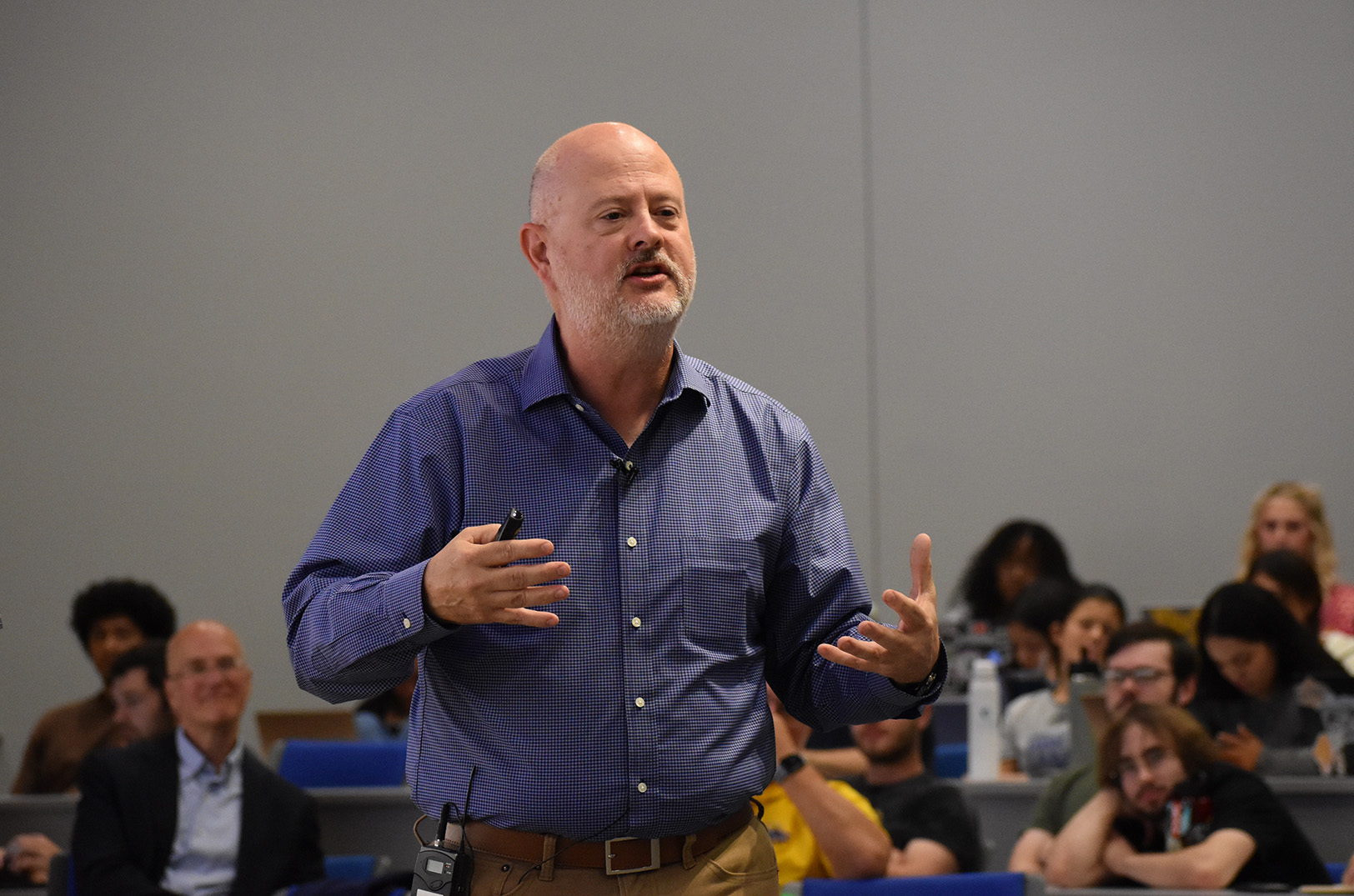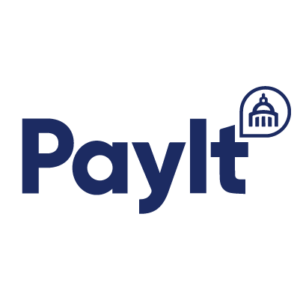Mike Plunkett’s journey with PayIt came to an early, but critical crossroads when a wealthy entrepreneur offered half-million dollars to support the Kansas City-built govtech venture, he recalled. The catch: this investor insisted on imposing control and veto power as they committed more funds.
Despite being low on funds, the PayIt team — led by co-founders Plunkett and John Thomson — prioritized maintaining operational and strategic control of their company, declining the offer.
“Whether or not you’re financially successful, one of the rewards of being an entrepreneur is doing it your way,” Plunkett told a crowd of students gathered Tuesday for UMKC’s Entrepreneur Speaker Series. “It was our first chance ever for either of us to do it from the beginning to create a culture.”
Today, PayIt — a cutting-edge SaaS platform that streamlines interactions between government agencies and the public — boasts contracts serving more than 100 million residents. The technology, which has earned PayIt a spot on the GovTech 100 list for seven years and counting, allows users a range of functions — from paying property taxes to renewing licenses — on their mobile devices, depending on the needs and priorities of partnering government agencies.
The company is one of Kansas City’s most-invested scaleups, but Plunkett cautioned students against assuming he and his co-founder have all the answers.
Startup success stories might offer insights into life as an entrepreneur, he said, but they aren’t a fool-proof blueprint for replicating the growth, scale and outcomes of founders who came before you.
“There’s no one size fits all. The ways people are successful in business aren’t always the way other people are successful,” said Plunkett. “So, as you hear people’s stories, glean from them things and ideas and concepts that apply to you. Look for common themes so you can build your own idea of what you want to do.”

Mike Plunkett, PayIt, speaks to a crowd of students gathered Tuesday for UMKC’s Entrepreneur Speaker Series; photo by Taylor Wilmore, Startland News
Build a business that works
Plunkett himself is a student of decades of experience, he told Tuesday’s crowd at UMKC’s Henry W. Bloch Executive School of Management, as part of a free First Tuesdays speaker series at the university.
Before the idea for Payit came to fruition, Plunkett studied accounting at UMKC, worked in corporate environments, managed a venture capital firm, and became CFO at Safe Fleet in 2012. It wasn’t until he and Thomson (who Plunkett originally met 30-plus years ago when volunteering with the American Legion Boys State of Missouri) reconnected at a Panera a decade ago that the pair decided to dive deep into the startup grind.
“I had a lot of respect for John. I knew that what he was best at was different from what I was best at, and we trusted each other,” said Plunkett. “We always talked about doing something together.”
Their Panera conversation sparked a solid “why” for their business, he recalled.
“How many of y’all have been to the DMV in Missouri or Kansas or anywhere else?” Plunkett asked the audience. “How many of you guys loved going? Yeah, no hands. That’s the problem. You always see a line of people waiting outside the DMV and — I’m going to use a technical expression here — that’s because doing business with the government sucks.”
The initial idea (and pain point) for PayIt came from Thomson’s own personal experience having to deal with the DMV after they gave him the wrong pin to pay for his vehicle registration. But one negative encounter isn’t enough of a catalyst to launch a venture, Plunkett said, noting Thomson needed validation that he wasn’t alone in the experience.
“It’s really important throughout growing a business, whether you’re an entrepreneur or you’re entrepreneurial, to be able to have people that trust you bounce ideas off,” he said.
The pair did not want to immediately hire a bunch of software engineers and build the product, and then try to sell. They first wanted customer feedback. To get it, they created early presentations with click-through demos on mobile phones to show and introduce their concept to governors, mayors, policymakers across the country.
One of PayIt’s first major stakeholders was the State of Kansas, with which the startups developed the iKan app.
“As we started to get feedback, and early commitments of support from the market from customers, then we decided to start raising our first round of money,” explained Plunkett. “Because we didn’t want to go raise money to build something and then find out that the dogs wouldn’t eat the dog food.”
Creating a seamless user experience also was key, he said, emphasizing the need to remember the people at the other end of the technology — and the reality that they don’t care how challenging it was to build; just that it works.
“When you’re on Amazon at 2am buying purple shoelaces, do you care how easy it was for Amazon to build that interface?” Plunkett asked. “No, it doesn’t occur to you at all. So, as an entrepreneur, you’ve got to remember what matters the most is the product in the hands of the customer. Whatever it takes, whether it’s easy or hard, you got to figure it out.”
Code authenticity into the journey

Spencer Claiborne asks Mike Plunkett a question during a Q&A portion of UMKC’s Entrepreneur Speaker Series; photo by Taylor Wilmore, Startland News
Plunkett acknowledged the importance of networking during a Q&A portion of the UMKC event — even for those like him who may not naturally excel at it. He also encouraged students to take advantage of opportunities within their academic communities for networking and personal growth at the Bloch School.
“Don’t start to network because ‘Oh, I need to have 100 people on my list or on my LinkedIn because that will lead to X, Y, and Z from my business,’” he said. “One, it doesn’t work. It’s the wrong motivation, and people see through it. If you’re genuinely interested in people, people can tell.”
“Think about why you would want to network. It’s not just you to start a business,” Plunkett continued. “It’s so you can get to know people and learn from them. Also just be part of the community.”
Plunkett’s parting advice to aspiring entrepreneurs: continue to grow your minds along with your businesses — starting by building authentic relationships with others.
“Be a lifelong learner, learn from people, start to build the reasons why you’re doing things, understand what appeals to you, build your brands and your networks because you genuinely care and want to be around people,” said Plunkett. “You can start doing that now, regardless of where your career takes you.”








































